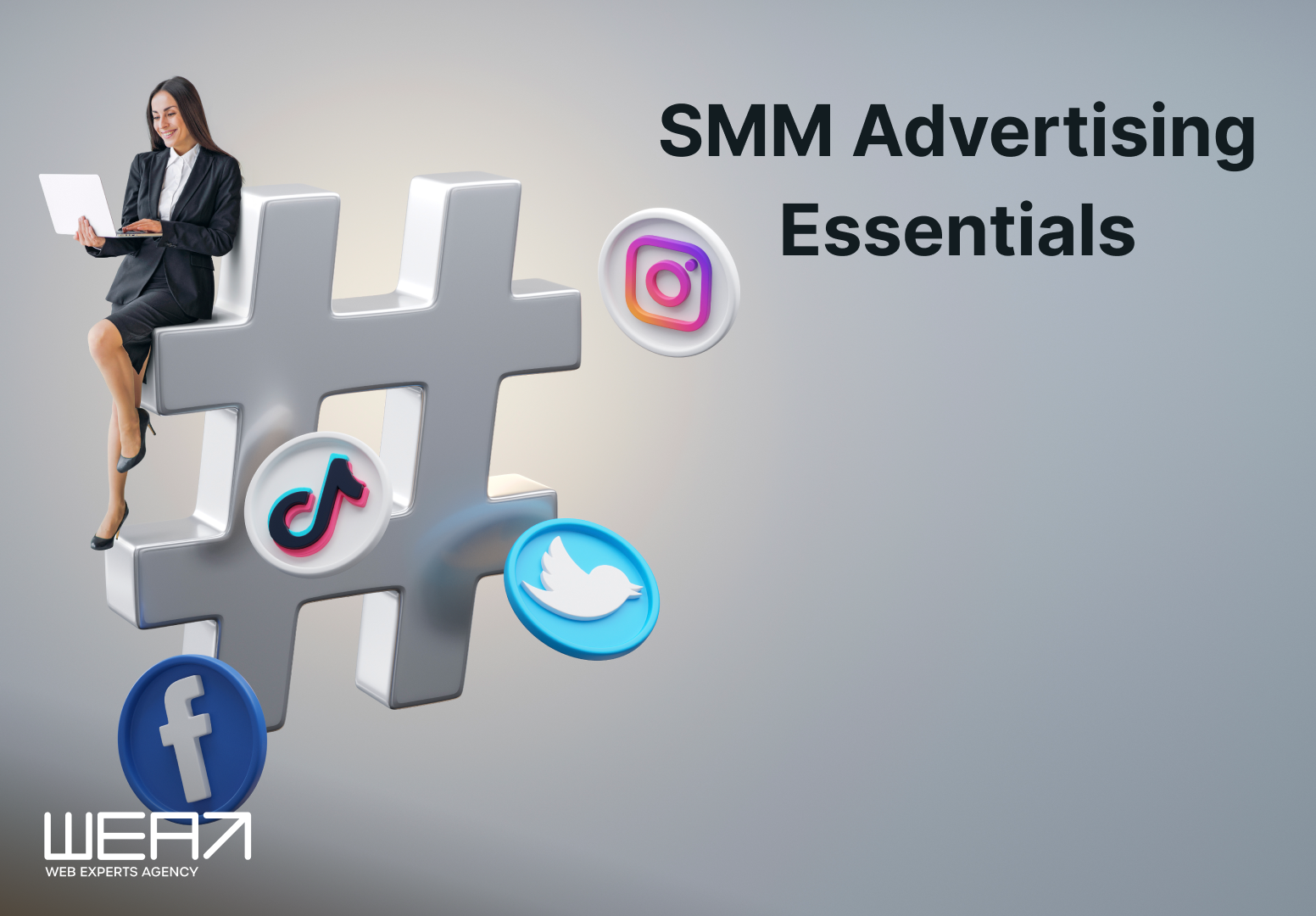
Social Media Marketing (SMM) refers to paid advertising on social media platforms. It is used to promote products, services, content, or brand messages to a targeted audience. Social media platforms like Facebook, Instagram, Twitter, LinkedIn, Pinterest, and others offer advertising solutions that allow businesses and individuals to reach their desired audience with precision and control.
SMM is a digital marketing strategy that leverages the power of social media to connect with users with the help of targeted ads that give the brands much greater visibility in a shorter span. Notably, social media ad spending is expected to cross the $300 billion mark by 2024. SMM encompasses various other activities, including creating and sharing content and interacting with the audience in a way that creates a buzz around the brand. Social media is famous as its users follow the underlying trends in the market or society. Understanding these trends and using them to the businesses’ advantage is the role of a content marketer.
Some key components of SMM have been discussed in the following section before diving into the dynamics of choosing an appropriate SMM platform for your business.

Understanding the role of SMM in digital marketing
SMM plays a crucial role in digital marketing as it is based on focused marketing strategies for social media platforms rather than the slow format of organic marketing. All the undertakings in this strategy are targeted for precise personas, locality, time, etc. The content that generates the most ROI has been identified as relatable, trending, information, funny, or all of these, as per HubSpot’s recent report. These campaigns are well quantified to calculate the ROI and assess the outcomes.
Here’s a breakdown of the role of SMM in digital marketing:
-
Audience Engagement and Interaction:
SMM enables businesses to promote audience engagement on social media handles. Brands can build relationships with customers and prospects through posts, comments, messages, and interactions.
-
Brand Awareness and Visibility:
SMM helps increase brand visibility by sharing content, updates, and promotions with a broad audience. Engaging content can go viral, extending reach beyond existing followers.
-
Content Distribution:
Social media platforms serve as distribution channels for sharing various types of content, including blog posts, videos, infographics, and more. This helps businesses get their content in front of a larger audience.
-
Lead Generation:
SMM strategies can include lead generation efforts such as running social media ads or offering gated content (e.g., ebooks webinars) to capture leads’ contact information.
-
Customer Support and Feedback:
Brands can use social media to support customers, answer inquiries, and address concerns. It’s also a valuable channel for gathering feedback and improving products or services.
-
Targeted Advertising:
Social media platforms offer sophisticated targeting options for advertising. Advertisers can reach specific demographics, interests, and behaviors and retarget website visitors.
-
Community Building:
SMM helps businesses build communities and online forums where customers and fans can interact with each other and the brand. These communities foster loyalty and advocacy.
-
Monitoring and Insights:
Social media tools provide analytics and insights into audience behavior, engagement metrics, and campaign performance. This data guides marketing strategies and optimizations.
-
Competitor Analysis:
SMM allows businesses to monitor and analyze competitors’ social media activities, gaining insights into their strategies and audience engagement.
-
Promotions and Contests:
Brands often run promotions, contests, and giveaways to highlight their social presence, increase followers, and generate buzz around their products or services.
-
Influencer Marketing:
SMM facilitates influencer partnerships, where influencers with large followings promote a brand’s products or services to their audience, leveraging their trust and credibility.
-
Crisis Management:
When a public relations crisis or negative sentiment befalls a business, SMM can be used to address issues, provide transparency, and manage reputational damage.
-
Social Listening:
Brands can use social listening tools to monitor mentions, trends, and sentiment around their brand or industry. This informs marketing strategies and allows for timely responses.
-
Multichannel Marketing:
SMM complements other digital marketing channels, such as email marketing, SEO, and content marketing. Integrating SMM with these channels creates a cohesive digital marketing strategy.
-
Mobile-Friendly Reach:
Many users access social media platforms via mobile devices. SMM ensures that brands can reach a mobile audience effectively.
Choosing the right SMM platform
Choosing the proper social media marketing (SMM) platform is essential to nudge prospective customers and achieve your sales goals through effective marketing. To make an informed decision, consider the following steps when selecting the right SMM platforms for your business:
-
Define Your Target Audience:
Before choosing a platform, it’s crucial to have a clear understanding of your target audience. Who are your ideal customers? What are their demographics, interests, behaviors, and preferences? The platform you choose should align with your audience’s characteristics.
-
Set Your Advertising Goals:
Determine your advertising objectives, namely increasing brand awareness, driving website traffic, generating leads, boosting sales, etc. Different platforms may be more effective for various goals.
-
Know Your Budget:
Understand your budget constraints. Different platforms have varying advertising costs, and your budget will influence which platforms you can effectively use. Some platforms may offer cost-effective options for smaller budgets, while others may require more significant investments.
-
Research Platform Demographics:
Each social media platform has a unique user base with distinct demographics and interests. Researching users’ demographics on every platform helps assess whether it aligns with the focus group. For example, LinkedIn is known for its professional audience, while Instagram is popular among younger users.
-
Analyze Platform Features:
Evaluate each platform’s advertising features and tools. Consider factors such as ad formats (e.g., image, video, carousel ads), targeting options, ad placements, and tracking capabilities. Some platforms may offer more advanced targeting and ad customization features than others.
-
Competitor Analysis:
Analyze where your competitors are advertising and their performance on different platforms. This can provide insights into which platforms are effective for your industry or niche.
-
Content Relevance:
Consider the type of content you plan to promote. Specific platforms may be better suited for visual content (e.g., Instagram, Pinterest), while others may be more text-centric (e.g., Twitter, LinkedIn). Choosing a platform that suits your content strategy and format is of the essence.
-
Platform Popularity and Trends:
Stay informed about platform popularity and emerging trends. Platforms currently trending or experiencing rapid user growth may present new opportunities for reaching a larger audience.
-
Test and Measure:
Running small test campaigns on multiple platforms is often beneficial to assess their effectiveness. Use analytics and performance metrics to measure your campaign’s success and make alterations as required.
-
Consider Your Industry and Goals:
The suitability of a platform can also depend on your industry or niche. Some industries may succeed on platforms that others use less commonly. Additionally, specific campaign goals may align better with certain platforms.
-
Consult with Experts:
If unsure which platform is best for your SMM advertising, consider consulting with social media marketing experts or agencies. They can provide guidance based on their experience and industry knowledge.
In summary, by conducting careful research and analysis, informed decisions can be made that maximize the effectiveness of your social media advertising efforts.

Exemplifying your drive for SMM
Here’s an example of how a fictional business might exemplify its drive for SMM as part of its marketing strategy:
Fictional Business: TechConnect
SMM Strategy: Boosting Brand Awareness and Engagement
Objective: TechConnect aims to increase brand awareness, engage with its tech-savvy audience, and drive website traffic through social media marketing efforts.
-
Platform Selection:
TechConnect identifies that its target audience, which includes technology enthusiasts, professionals, and early adopters, is most active on platforms such as LinkedIn, Twitter, and YouTube. This selection depends on the business’s relevance and not the forum’s absolute popularity. TechConnect did not choose Facebook as its target media platform despite being the most popular social network as of January 2023.
-
Content Strategy:
The company creates and shares a variety of tech-related content, including:
- Informative blog posts on emerging tech trends and industry insights
- Video tutorials showcasing the latest gadgets and software
- Live webinars with tech experts discussing relevant topics
- Engaging infographics and visual content illustrating complex tech concepts
-
Audience Engagement:
TechConnect actively engages with its audience by:
- Responding promptly to comments, messages, and inquiries.
- Running interactive Q&A sessions with industry experts.
- Encouraging user-generated content, such as tech tips and product reviews.
- Conducting polls and surveys to gather insights and feedback.
-
Influencer Partnerships:
The company collaborates with influential tech bloggers and YouTubers who share its target audience. These influencers review TechConnect’s products and promote them to their followers.
-
Paid Advertising:
TechConnect invests in paid advertising campaigns on Twitter and LinkedIn to expand its reach and target professionals interested in tech innovations.
-
Metrics and Analysis:
The marketing team regularly analyzes performance metrics, including engagement rates, click-through rates, and website traffic from social media. They use this data to refine their content strategy and optimize ad campaigns.
-
Consistency:
TechConnect maintains a consistent posting schedule, ensuring that followers can regularly rely on fresh and relevant content.
-
Ongoing Adaptation:
The marketing team stays informed about changes in social media algorithms, user behaviors, and emerging trends. They adjust their SMM strategy accordingly to remain effective.
-
Community Building:
TechConnect fosters community among its followers by creating tech-focused groups and forums on LinkedIn and Twitter. These communities allow enthusiasts to discuss tech topics and share their knowledge.
-
Mobile Optimization:
All content and advertising campaigns are optimized for mobile devices, as many tech enthusiasts access social media on smartphones and tablets.
-
Reporting Success:
TechConnect celebrates milestones with its audience, such as reaching a certain number of followers or achieving high engagement rates. This builds a positive brand image and encourages user participation.
By opting for this SMM strategy, TechConnect successfully increased its brand awareness among its target audience through engagement that drove website traffic, ultimately contributing to its marketing objectives and business growth.
FAQs
Q. What are the privacy concerns around SMM?
A. Social Media Marketing (SMM) presents several privacy concerns for businesses and users: compliance for the former and privacy for the latter.
Q. Is SMM a good monetizing strategy?
A. Social Media Marketing (SMM) can be an effective monetizing strategy for businesses when implemented strategically and aligned with their objectives and target audience.
Q. Should startups pursue SMM for growth?
A. Social Media Marketing (SMM) can be a valuable strategy for startups seeking growth. Still, its effectiveness depends on various factors, including the nature of the business, target audience, available resources, and marketing goals.
Q. Does dishonest SMM bring more bad repute than good?
A. Yes, using unethical or deceptive tactics in SMM can damage a company’s reputation, erode trust with its audience, and have long-term negative consequences.
Q. What is the 3-second rule on social media?
A. The “3-second rule” in social media refers to having a concise window of time, typically around three seconds, to capture a user’s attention and engage them with your content when they come across it in their social media feed.




